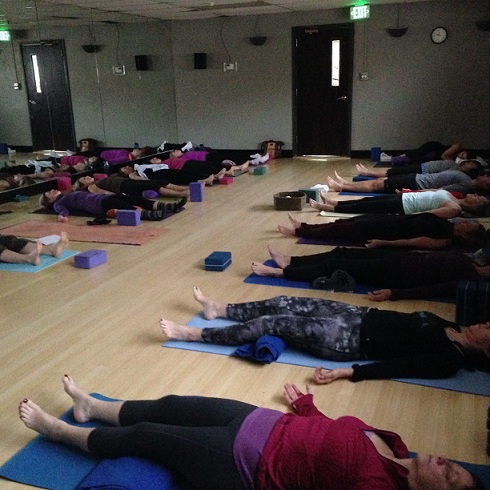
For a while now, I’ve been thinking of an idea that is popular in spirituality and health circles, but is as well grounded in yoga philosophy. It appears in various guises, names, and nuances: letting go, releasing, vairagya/dispassion, allowing. We’ve heard “just let it go,” which is so easy to say, and so hard to do. And that, exactly, is the problem. Letting go is un-doing, which seems impossible.
I’ve been thinking about it because it feels very important to me in my practice right now. With many years of practicing yoga, I seem to have embodied well the idea of practice and discipline. I know the efficacy of doing, of getting on my yoga mat, my meditation cushion, sitting down with a book or recording of my teachers to do studies, contemplating and writing. This I can do. But what about undoing?
To some extent, what has been done cannot be undone. I ate that chocolate cake, I took a nap instead of going for a walk, the injury happened, be it physical and/or emotional. This relates to karma, and the idea that every action has a consequence. My strategy has generally been to try to make better choices, and this is critical on the path of yoga. For example, redirecting my desire for cake to a healthier choice. My practice has definitely aided in making better choices overall.
Yet I can’t help but sense there’s more to it. Through my practice, I have noticed many attachments fall by the wayside when they no longer fit into my life. The letting go happened naturally like when a kid no longer cares for particular toys. Often it seems this happens because something else becomes more attractive. Again this is the result of replacing one attachment with another hopefully more adaptive one.
Still there are some persistent deep rooted patterns that continue to lurk, even after decades of practice. And as I’ve introspected, my conclusion is that in general they are all a fundamental disconnectedness with _____ . You fill in the blank: source, God, Self, heart, etc. It is a contraction that makes me feel smaller, and Tantric yoga philosophy calls it the “anava mala,” the fundamental separation of the individual being from divine source. It is a necessary contraction for the individual soul to become embodied, to take on the limitations of a body-mind.
How does one meet these deep-seated contractive patterns? I sense this is a place for actively letting go. But it feels extremely paradoxical. How does one undo? How does one actually release some deep seated pattern that has been reinforced for years, perhaps lifetimes? Can it be done, more precisely “undone,” or is it more of a process of replacing bad patterns with good patterns?
As a good yogi who started practicing on the level of the body, that’s where I am beginning my experimentation with letting go. I’ve begun to watch how much I hold in my body. I watched it first in shavasana, the relaxation and integration pose we do at the end of yoga class. There I can feel my body actively release. I put my attention to a contracted area and ask it to let go. For me this begins with my shoulders, as I am one of those people that carries the weight of the world there. So as I am in shavasana, I allow the muscles of my shoulders to release. Then I notice where else feels contracted, usually my jaw or my face, and again, send the message to relax.
I’ve also noticed it on the massage table, in the dentist’s chair, when I’m on a walk. I notice it as I sit here typing. I take a deep breath and release unnecessarily contracted muscles.
So I’m making some progress on the physical level. And I suspect this is teaching me something about letting go the deeper layers of psychological and emotional patterns that keep popping up. How do I let those go?
I have a lot of ideas, but I really don’t know. And for me, saying “I don’t know” is a form of letting go. That’s a start.
Stay tuned, I hope to have more to add as I continue my explorations. For now, you are invited to practice noticing and releasing bodily contractive patterns, shavasana is a great place to start. As well, I invite your contemplations on this subject.
